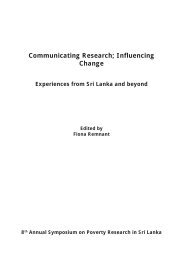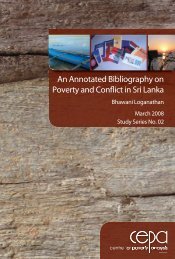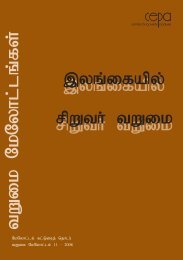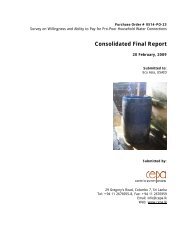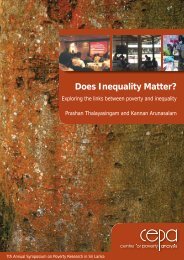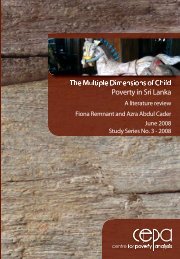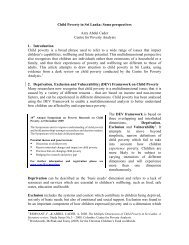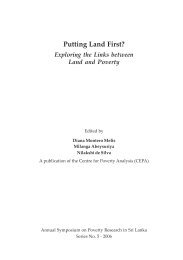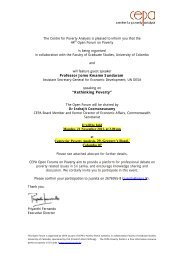Involuntary Displacement and Resettlement â Policy and ... - CEPA
Involuntary Displacement and Resettlement â Policy and ... - CEPA
Involuntary Displacement and Resettlement â Policy and ... - CEPA
- No tags were found...
Create successful ePaper yourself
Turn your PDF publications into a flip-book with our unique Google optimized e-Paper software.
assist the displaced eased the phase of reception, <strong>and</strong> provided a good basisfor rebuilding the lives of the northern Muslims <strong>and</strong> for the local integrationprocesses 6 .For the first month or so the host population was essential for the survival ofthe IDPs, <strong>and</strong> the role of the host community was often referred to by thenorthern Muslims with almost unlimited gratitude. This dominant story toldby both IDPs <strong>and</strong> locals may have been accentuated over the years.According to a survey we did, not everyone helped when the northernMuslims arrived. Less than 50% of the people we interviewed had actuallyhelped. It was predominantly the local Muslims living in the towns <strong>and</strong>villages where the northern Muslims first arrived who were involved in theassistance, <strong>and</strong> fewer Sinhalese <strong>and</strong> Tamils took part in welcoming <strong>and</strong>helping the northern Muslims.In the Islamic ethic we find clear parallels to the ICRC approach mentionedabove. It is about helping all strangers, not singling out some groups.However,I must provide one modification here because this unlimitedresponsibility to all strangers was not the main message among the peopleinterviewed in Puttalam. People talked more about helping “our Muslimbrothers <strong>and</strong> sisters” than a general obligation to assist. Still, the Islamicethic prevailed in the act of receiving the displaced.The Humanitarian DiscourseThe second discourse to influence the formation of the ‘IDP’ <strong>and</strong> ‘host’categories in Puttalam was the humanitarian discourse, what I termed theUN-Brookings-Bern approach above. In this context it is important toemphasise that ‘Internally Displaced Persons’ has become a well establishedterm <strong>and</strong> category in Sri Lanka. Today, the acronym IDP is commonly used bypoliticians, newspapers <strong>and</strong> people in general. The term came into commonusage through the myriad of institutions, committees, organisations –governmental, nongovernmental <strong>and</strong> multilateral – <strong>and</strong> researchers workingwith <strong>and</strong> writing about displacement. In fact, the term internal displacementwas used in Sri Lanka before it became an internationally recognised term.UNHCR played a key role in this process, <strong>and</strong> the agency’s involvement in6It has been shown by several authors that granting asylum <strong>and</strong> refuge constitutes a moral <strong>and</strong>legal obligation in Islam (Elmadmad 1991, Muzaffar 2001). Elmadmad shows how obligations ofwelcoming guests in Islam also encompass the obligation for all Muslims to grant asylum <strong>and</strong>protection to any person who asks for it, whatever the reason for his or her flight. Additionally,as Muzaffar shows, the role of almsgiving – ‘zakath’ – plays a key role in financing refugee relief,rehabilitation <strong>and</strong> development. The principle of zakath refers to compulsory almsgiving indeference to the rights of the poor <strong>and</strong> refugees. Principles of welcoming refugees <strong>and</strong> givingzakath are referred to in the Koran (see, for example, Koran 8:70–71 <strong>and</strong> 59:8).133



